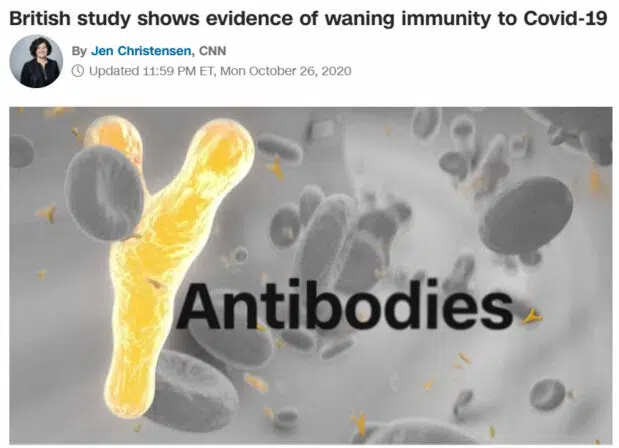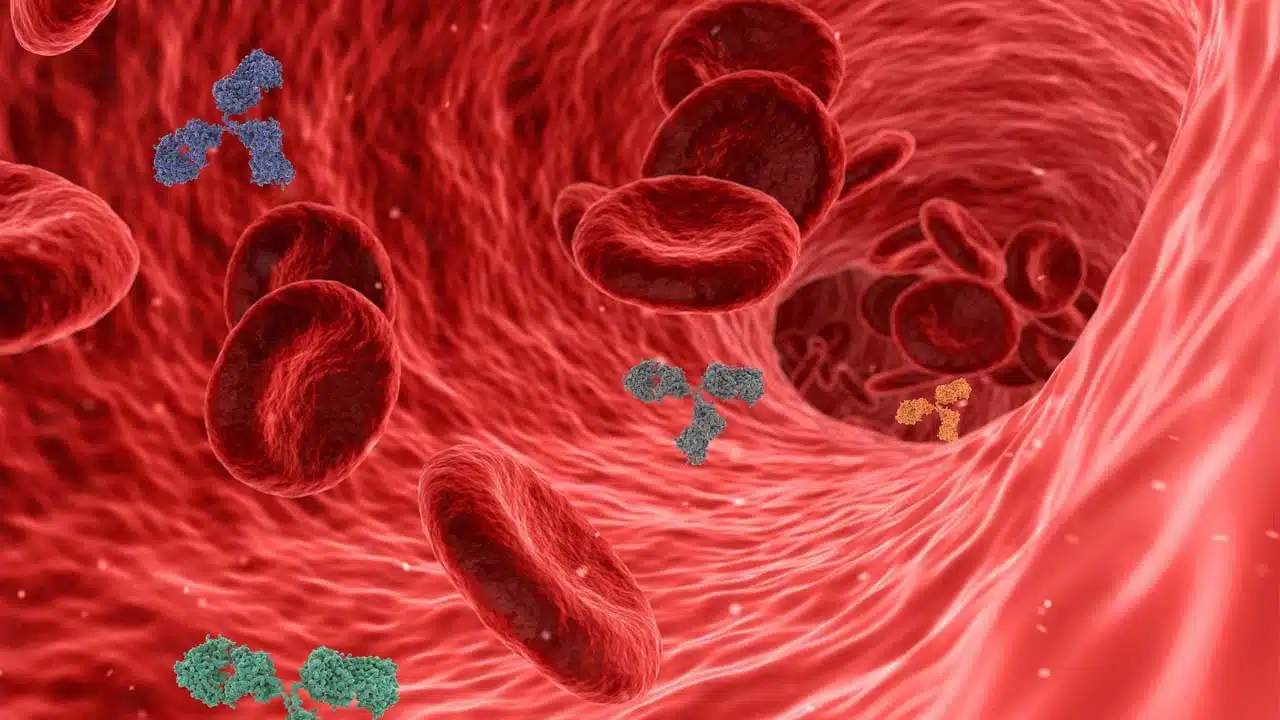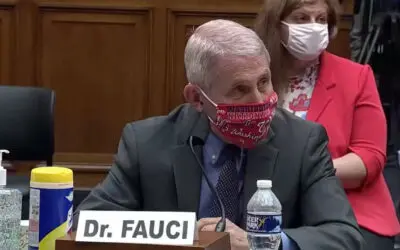This is the fourth of an extensive series of articles about natural immunity to SARS‑CoV‑2 and how it compares to the immunity induced by COVID‑19 vaccines. Links to each installment of the series will be compiled on this overview page as they are published. I highly recommend that you be sure to have read prior installments to get the most out of this one.
In March 2020, governments began responding to the newly declared COVID‑19 pandemic by implementing authoritarian “lockdown” measures for which the stated endgame was mass vaccination.[1] This policy goal would require persuading or coercing people to accept vaccines for which there would be no data from randomized placebo-controlled clinical trials comparing long-term health outcomes, including all-cause mortality, between vaccinated and unvaccinated individuals.
In pursuance of that policy aim, the propaganda narrative that natural immunity to SARS‑CoV‑2 is weak and short-lived began early, while the vaccines were still under development. Throughout the summer of 2020, the public was frequently bombarded with messages about how we would need vaccines to provide strong immunity because natural immunity was so inadequate. The mainstream media, as usual, was complicit in propagating the disinformation to the public.
“Immunity to the coronavirus is ‘fragile’ and ‘short-lived,’ immunologist warns”, declared a CNBC headline on July 7, 2020, for instance. The source for that claim was Danny Altmann, a professor of immunology at Imperial College London.[2]
Imperial College London, you may recall, was the same institution that, in collaboration with the World Health Organization (WHO), produced the influential model back in March 2020 advocating implementation and continuance of strict lockdown measures until a vaccine could be rapidly developed and fast-tracked through the governmental regulatory process.[3]
“Immunity to Covid‑19 could be lost in months, UK study suggests”, a headline in The Guardian similarly proclaimed on July 12. The article reported on a study by researchers from King’s College London (not to be confused with Imperial College London) and relayed the claim made by Professor Jonathan Heeney, a virologist at the University of Cambridge, that the study “confirmed a growing body of evidence that immunity to COVID‑19 is short-lived”.
“Most importantly,” Heeney was quoted as saying, “it puts another nail in the coffin of the dangerous concept of [natural] herd immunity.”[4]
What Heeney meant was that mass vaccination would be required to achieve population or “herd” immunity because natural immunity could only be attained through infection, which carried the risk of severe disease and death, and because natural immunity was, he claimed, inadequate.
That argument rested on a falsehood, as we will see. It also overlooked the fact that the risk of severe COVID‑19 was low for a large proportion of the population. Precisely the opposite argument could be made that what was required to minimize deaths in the long run was for younger, healthier individuals who are at low risk to attain the superior immunity conferred by infection and thereby to build up the strong population immunity that would be required to protect those at highest risk.[5]
In fact, as mentioned in the introduction to this series, if the phenomenon of “original antigenic sin” occurs with COVID‑19 vaccines, then attainment of the superior immunity conferred by infection must be seen as an opportunity cost of vaccination, and mass vaccination would impede rather than contribute to the development of the population immunity required to minimize deaths in the long run.
The idea that priming the immune system by vaccination could prejudice the immune system to respond suboptimally to subsequent exposures is not far-fetched. For example, it has been proposed as an explanation for studies finding receipt of the influenza vaccine to be associated with an increased risk of influenza illness.
The reasoning is that vaccination confers protection only against the three or four influenza strains targeted by the vaccine (depending on whether it is a trivalent or quadrivalent formulation) and prejudices the immune system to respond suboptimally to other strains, whereas infection results in a stronger immunity that is cross-protective against other strains, as well.[6]
The similar phenomenon of “linked-epitope suppression” has been observed for the diphtheria, tetanus, and acellular pertussis (DTaP) vaccine, leading the author of a paper published in the Journal of Pediatric Infectious Diseases Society in 2019 to remark that, in comparison to children whose immune systems were primed by infection, “all children who were primed by DTaP vaccines will be more susceptible to pertussis throughout their lifetimes, and there is no easy way to decrease this increased lifetime susceptibility.”[7]
Natural herd immunity is not a “dangerous concept”; it is a real natural phenomenon and such a basic epidemiological concept that it’s built into the lockdown advocates’ own models. It was, for instance, a basic assumption in the influential Imperial College London paper that individuals who recovered from infection would have acquired immunity and contribute to the development of herd immunity, which in turn would result in reduced transmission of the virus.[8]
The propaganda claim that herd immunity could not be attained without mass vaccination because natural immunity was short-lived continued through the fall of 2020.
For instance, on October 16, MSN ran with the headline “Doctor says COVID‑19 immunity wanes after 3 months”.[9]
On October 26, a CNN headline declared “British study shows evidence of waning immunity to Covid-19”. As the article alarmingly reported, “A study of hundreds of thousands of people across England suggests immunity to the coronavirus is gradually wearing off—at least according to one measure.”[10]
However, all the claims being made that evidence was suggesting that immunity was rapidly waning were false. What the fearmongering headlines were all referring to, specifically, were studies in which the level of antibodies in the blood, or the antibody titer, was measured for people who had recovered from COVID‑19, with the results indicating that their antibodies were quickly disappearing.
What the media failed to explain to the public was the fact that it is normal for antibody titers to fall rapidly from peak levels after recovery from infection and that this does not mean that immunity is lost.

To illustrate the deliberate deception, take the specific study referred to in the CNN report, which was conducted by researchers from Imperial College London and published on the preprint server medRxiv on October 27. That study found that immunoglobulin G (IgG) antibodies to the spike protein of SARS‑CoV‑2 decreased significantly over time, which the authors suggested could mean “decreasing population immunity and increasing risk of reinfection”.[11]
The study’s findings were summarized by Medscape, a top news website for healthcare professionals, with the headline “COVID‑19: Immunity From Antibodies May Decline Rapidly”.[12]
As reported by the BBC, the study found that “the number of people testing positive for antibodies has fallen by 26% between June and September”, which the study authors said meant that “immunity appears to be fading”.[13]
The lead author of the study, Professor Helen Ward of Imperial College London, explicitly interpreted their findings to mean that “Immunity is waning quite rapidly.”[14]
While proclaiming that a loss of antibodies meant loss of immunity, the study’s authors also confusingly delivered the message that even if people do have a high level of antibodies, it still does not mean that they are immune. The conclusion that members of the public were evidently supposed to draw was that natural immunity might be very weak if it existed at all.
But how could both be true? How could a decline in antibodies mean loss of immunity and yet a high level of antibodies not equal immunity? Neither the study’s authors nor the media bothered to try to reconcile the apparent self-contradiction. The purpose of the confusing messaging, however, was obvious: to downplay the effectiveness of natural immunity at preventing infection, disease, and transmission and thereby to manufacture consent for the continued lockdown measures and their mass vaccination endgame.
“Testing positive for antibodies does not mean you are immune to COVID‑19”, said the senior author of the study, Professor Paul Elliott of Imperial College London. “It remains unclear what level of immunity antibodies provide, or for how long this immunity lasts. If someone tests positive for antibodies, they still need to follow national guidelines including social distancing measures, getting a swab test if they have symptoms and wearing face coverings where required.”
Adding to the confusion of the public messaging, the study authors also acknowledged in an Imperial College press release that the loss of a detectable level of antibodies in an individual’s blood did not necessarily mean that the person has lost their immunity.
Directly contradicting her explicit claim that waning antibodies equaled loss of immunity, Professor Ward admitted in the press release that they “don’t yet know whether this will leave these people at risk of reinfection with the virus that causes COVID‑19”. Because of this uncertainty, she said, “it is essential that everyone continues to follow guidance to reduce the risk to themselves and others.”[15]
So, on one hand, the public was being told that antibodies equaled immunity, and therefore a loss of antibodies meant a loss of immunity. On the other hand, the public was told was that even a high antibody titer didn’t mean that a person is immune, and therefore even people who’ve recovered from infection still needed to obey the demands of their overlords until they could be saved by a vaccine.
The fact that those two messages were self-contradictory was evidently of no concern either to the study authors or the mainstream media. This is a useful illustration of the cognitive dissonance that is required to maintain the official propaganda narrative.
The key to unlocking the mystery was the admission that just because someone loses antibodies does not mean that they have lost immunity. While contained within the college’s press release, that admission was not widely broadcast through the media, just as there was no effort made to reconcile the self-contradiction in media reports about the study.
The truth that was being obfuscated or altogether withheld from the public, once again, is that antibodies do not equal immunity, and a loss of antibodies therefore does not equal loss of immunity.
By propagating the false narrative of rapidly lost immunity, however, the propagandists were creating another problem for themselves. Convincing the public that natural immunity was short-lived could have the unintended consequence of also persuading critically thinking news consumers that the immunity induced by any future vaccines would therefore be short-lived, too.
This posed a conundrum for lockdown advocates. Anticipating this objection to their endgame strategy, Professor Elliott said, “The vaccine response may behave differently to the response to natural infection.” By “differently”, of course, he meant that vaccines might confer more robust and longer-lasting immunity.[16]
Thus, well over a month before the first vaccine received emergency use authorization from the US Food and Drug Administration (FDA), and without any supportive data from clinical trials, the idea that vaccines would provide superior protection against SARS‑CoV‑2 than natural immunity was already being implanted into the public mind.
Another obstacle for the propagandists, however, was the fact that, despite an ongoing global pandemic, documented cases of reinfection remained very rare.
As observed by the authors of a research letter published in JAMA Internal Medicine on May 28, 2021, “Despite more than 150 million people becoming infected worldwide, SARS‑CoV‑2 reinfections are uncommon.” More than fourteen months after the WHO had declared a pandemic, the available evidence suggested that “reinfections are rare events”, and hence natural immunity “appears to confer a protective effect for at least a year”.[17]
Of course, it was no less true during the summer and fall of 2020 that cases of reinfection were rare, which contradicted the claim that natural immunity might offer inadequate protection and therefore that people who’ve recovered from infection still needed to obey the diktats of policymakers. If natural immunity was so weak and short-lived, why weren’t reinfections common?
The propagandists had no answer to that question, which would intuitively leap into the minds of any news consumers who were well enough aware of the reality.
Apart from the low rate of reinfection, there was also already a growing body of research strongly indicating that natural immunity would be very long-lived, including due to protection from persistent antibodies, which some studies had mistakenly found to rapidly disappear.
These erroneous findings were due to the types of tests that were being used to measure blood levels earlier in the pandemic. There are different types of antibodies and different parts of the virus with which antibodies bind. There are different testing sensitivities and specificities. Later studies using more advanced testing methodologies found general persistence of antibodies capable of neutralizing the virus in people who’d recovered from infection.
Instructively, Imperial College London—which played a leading role in propagating the fearmongering messages being used to manufacture consent for the lockdowns and their mass vaccination endgame—was itself working on a COVID‑19 vaccine.

In April 2020, just a few weeks after Imperial College London played such an instrumental role in persuading the government of the UK and other countries to implement lockdowns, the institution’s vaccine development team secured £22.5 million in British taxpayers’ money (about $31 million in US dollars) to fast-track development of a COVID‑19 vaccine.[18]
As The Guardian instructively revealed in its article about the King’s College London study, one obstacle identified by the institution’s vaccine development team was that “it is still unclear what kind of immune response is needed to prevent infection.”[19] That admission, of course, didn’t stop the newspaper from running its alarmist headline that natural immunity “could be lost in months”. Nor did it stop vaccine developers from forging ahead based on assumptions about how immunity worked with SARS‑CoV‑2.
The whole premise of the fearmongering claims was that declining antibodies equaled waning immunity. It was only especially savvy news consumers who read past the alarmist headlines and critically examined the information presented who could pick up on the subtle clues that this premise was false.
One such clue was found near the very end of the Guardian article. Readers who made it that far into the article could learn from an immunologist uninvolved in the King’s College London study that “antibodies are only part of the story.”
Paraphrasing the immunologist, Professor Arne Akbar of University College London (UCL), The Guardian disclosed that “patients who fight the virus with T cells may not need to churn out high levels of antibodies” to be protected (emphasis added). Furthermore, there was “growing evidence that T cells produced to fight common colds can protect people as well.”
That message was quickly, lost, however, as the Guardian article concluded by quoting Professor Robin Shattock of Imperial College London, whom the newspaper disclosed was working on development of a COVID‑19 vaccine, saying that the main finding of his colleagues’ study suggested that we should have little confidence that natural immunity would be effective in preventing reinfection and transmission of the coronavirus.
The findings also indicated, Shattock added, “that vaccines need to do better than natural infection” by inducing “sustained levels of protective antibodies.” Ultimately, he conceded, that might require the use of annual “boosting” shots, which, he suggested, could be coadministered with annual flu shots.[20]
In addition to picking up on the clue left by Professor Akbar, particularly savvy news consumers might have also clicked the link provided to read the King’s College London study for themselves, in which case they would have learned that the study’s authors certainly knew that their findings did not support the alarmist claim that natural immunity was being rapidly lost. To the contrary, that study, published on the preprint server medRxiv on July 11, 2020, noted strong indications that the immunity conferred by infection would be durable.
“Importantly,” the study authors wrote, “class-switched IgG memory B cells” against the spike (S) protein of SARS‑CoV‑2 and an area on that protein known as the “receptor binding domain” (RBD) had been detected in the blood of patients who recovered from COVID‑19, which showed that “memory responses are generated during infection.” (Emphasis added.)
In other words, there was evidence that infection with SARS‑CoV‑2 would confer immunologic memory so that, even if circulating antibodies waned over time, they could be rapidly produced again in the event of reexposure to the virus without the immune system having to relearn all over again how to fight off an infection.
The researchers further noted that, despite the apparent waning of neutralizing antibodies, even low levels may “still be sufficient to provide protection from COVID‑19 disease for a period of time.”[21]
So why didn’t the Guardian headline inform the public that the finding of waning antibodies was no cause for alarm? Why instead the fearmongering message?
The CNN article reporting on the Imperial College London study, too, left clues for the savvy news consumer to pick up on. Those who read past the alarmist headline could learn that waning antibodies didn’t necessarily mean that people would lose their immunity because there were also “T cell immunity and the body’s memory responses”.[22]
The Imperial College London researchers, too, understood perfectly well that the alarmist claim making headlines was false. They certainly knew that a decline in antibodies was normal and did not mean that immunity was lost. In their paper, which was published at medRxiv on October 27, 2020, they explicitly acknowledged this fact (emphasis added):
The relevance of antibody waning for the potential for reinfection by SARS‑CoV‑2 is currently not resolved. During any antibody response to an acute pathogen, some level of antibody waning in the months following infection is expected as short-lived plasma cells die. Low levels of affinity-matured antibody usually continue to be produced by long-lived plasma cells and may be sufficient to maintain levels of antibody that confer immunity.
In stark contrast to the message that made the headlines and the explicit claim made by the lead author, in their published paper, the researchers did not conclude that declining antibodies meant lost immunity. On the contrary, they explicitly stated (emphasis added):
We cannot know at this time how this relates to the level of antibody that confers protection from infection . . . . The relevant thresholds for protection in humans who are naturally exposed to virus remain to be defined . . . . In addition, it is currently not clear what contribution T cell immunity and memory responses will play in protective immunity during re-exposure. As such, it is not possible to say with certainty that the loss of antibody positivity . . . would correlate with an increased risk of an individual being reinfected. . . . Decline may initially be rapid, before plateauing . . . .”
The researchers also noted their study’s limitation that the antibody test they had used “detects antibodies against the spike protein (anti-S), but is qualitative rather than quantitative, and the threshold of detection is not stated in manufacturer’s instructions.”[23]
As we will see in future installments of this series, later studies using more advanced tests overturned such early results by showing that, after an initial decline in anti-spike antibodies, the rate of decay indeed slowed over time and eventually plateaued with persistence of detectable antibodies in the blood. Later studies also showed that infection indeed confers long-lived immunologic memory and, additionally, demonstrated the importance of T cell or cellular immunity relative to antibody or humoral immunity.
In the next installment, the deliberateness of the deception will be further revealed by demonstrating that it was perfectly well understood within the scientific community that an initial rapid decline in antibody titers is normal and expected and certainly does not indicate that people are losing their immunity.
[1] Neil M Ferguson et al., “Report 9: Impact of non-pharmaceutical interventions (NPIs) to reduce COVID‑19 mortality and healthcare demand”, Imperial College London, March 16, 2020, https://www.imperial.ac.uk/mrc-global-infectious-disease-analysis/covid-19/report-9-impact-of-npis-on-covid-19/. For further discussion, see my video overview: Jeremy R. Hammond, “SARS-CoV-2 Response: Imperial College Model and Lockdown Endgame”, JeremyRHammond.com, April 17, 2020, https://www.jeremyrhammond.com/2020/04/17/sars-cov-2-response-imperial-college-model-and-lockdown-endgame/.
[2] Chloe Taylor, “Immunity to the coronavirus is ‘fragile’ and ‘short-lived,’ immunologist warns”, CNBC, July 7, 2020, https://www.cnbc.com/2020/07/06/immunity-to-coronavirus-is-fragile-and-short-lived-expert-warns.html.
[3] Ferguson et al., “Report 9”. Hammond, “SARS-CoV-2 Response”.
[4] Ian Sample, “Immunity to Covid-19 could be lost in months, UK study suggests”, The Guardian, July 12, 2020, https://www.theguardian.com/world/2020/jul/12/immunity-to-covid-19-could-be-lost-in-months-uk-study-suggests.
[5] To illustrate the much lower risk for younger, healthier people, a study published on the preprint server medRxiv on July 13, 2021, estimated that the infection fatality rate (IFR) for elderly people was 5.5 percent, which was reduced to 2.4 percent when looking only at elderly people living outside of nursing homes. By contrast, the estimated IFR was 0.59 percent for people aged 60 to 69, 0.27 percent for those in their fifties, 0.082 percent for those in their forties, 0.031 percent for those in their thirties, 0.014 percent for those in their twenties, and 0.0027 percent for those under the age of 20. Cathrine Axfors and John P.A. Ioannidis, “Infection fatality rate of COVID‑19 in community-dwelling populations with emphasis on the elderly: An overview”, medRxiv, July 13, 2021, https://doi.org/10.1101/2021.07.08.21260210.
[6] Danuta M. Skowronski, “Association between the 2008–09 Seasonal Influenza Vaccine and Pandemic H1N1 Illness during Spring–Summer 2009: Four Observational Studies from Canada”, PLoS Medicine, April 6, 2010, https://doi.org/10.1371/journal.pmed.1000258. Rogier Bodewes et al, “Annual Vaccination against Influenza Virus Hampers Development of Virus-Specific CD8+ T Cell Immunity in Children”, Journal of Virology, November 2011, https://www.ncbi.nlm.nih.gov/pmc/articles/PMC3209321/. For further discussion and documentation, see: Jeremy R. Hammond, “How You’re Being Lied to about the Risks of Getting a Flu Vaccine Annually”, JeremyRHammond.com, January 11, 2019, https://www.jeremyrhammond.com/2019/01/11/how-youre-being-lied-to-about-the-risks-of-getting-a-flu-vaccine-annually/.
[7] James D. Cherry, “The 112-Year Odyssey of Pertussis and Pertussis Vaccines—Mistakes Made and Implications for the Future”, Journal of the Pediatric Infectious Diseases Society, February 22, 2019, https://doi.org/10.1093/jpids/piz005.
[8] Ferguson et al., “Report 9”.
[9] KMVT/KSVT, “Doctor says COVID‑19 immunity wants after 3 months”, MSN.com, October 16, 2020, https://www.msn.com/en-us/health/medical/doctor-says-covid-19-immunity-wanes-after-3-months/ar-BB1a6ykY.
[10] Jen Christensen, “British study shows evidence of waning immunity to Covid-19”, CNN, October 26, 2020, https://www.cnn.com/2020/10/26/health/covid-19-immunity-wanes-large-study-finds/index.html.
[11] Helen Ward et al., “Declining prevalence of antibody positivity to SARS-CoV-2: a community study of 365,000 adults”, medRxiv, October 27, 2020, https://doi.org/10.1101/2020.10.26.20219725. As noted in the previous installment of this series, a preprint server is an online journal where studies are published before passing through the peer review process.
[12] Peter Russell, “COVID‑19: Immunity From Antibodies May Decline Rapidly”, Medscape, October 27, 2020, https://www.medscape.com/viewarticle/939804.
[13] James Gallagher, “Covid: Antibodies ‘fall rapidly after infection’”, BBC, October 27, 2020, https://www.bbc.com/news/health-54696873.
[14] Kathie McInnes, “Research supported by Keele University finds immunity to Covid-19 ‘wanes quite rapidly’”, StokeonTrentLive, October 27, 2020, https://www.stokesentinel.co.uk/news/stoke-on-trent-news/research-supported-keele-university-finds-4645648.
[15] Justine Alford, “Coronavirus antibody prevalence falling in England, REACT study shows”, Imperial College London, October 27, 2020, https://www.imperial.ac.uk/news/207333/coronavirus-antibody-prevalence-falling-england-react/.
[16] McInnes, “Research supported by Keele University”.
[17] Josè Vitale et al., “Assessment of SARS-CoV-2 Reinfection 1 Year After Primary Infection in a Population in Lombardy, Italy”, JAMA Internal Medicine, May 28, 2021, https://doi.org/10.1001/jamainternmed.2021.2959. JAMA publications are journals of the American Medical Association.
[18] Andrew Scheuber and Ryan O’Hare, “Imperial COVID‑19 vaccine team secures £22.5 million support”, Imperial College London, April 22, 2020, https://www.imperial.ac.uk/news/197017/imperial-covid-19-vaccine-team-secures-225/.
[19] Sample, “Immunity to Covid-19 could be lost in months”, previously cited.
[20] Sample, “Immunity to Covid-19 could be lost in months”, previously cited.
[21] Jeffrey Seow et al., “Longitudinal evaluation and decline of antibody responses in SARS-CoV-2 infection”, medRxiv, July 11, 2020, https://doi.org/10.1101/2020.07.09.20148429. This study was later published in Nature Microbiology. See: Jeffrey Seow et al., “Longitudinal observation and decline of neutralizing antibody responses in the three months following SARS-CoV-2 infection in humans”, Nature Microbiology, October 26, 2020, https://doi.org/10.1038/s41564-020-00813-8.
[22] Christensen, “British study shows evidence of waning immunity”, previously cited.
[23] Ward et al., “Declining prevalence of antibody positivity to SARS-CoV-2”, previously cited. For a better reading experience, in the quotations presented here, I have corrected obvious typos and grammatical errors contained in the original.




Well hopefully this Article gains some traction. I doubt it though, the brainwashed people of the world have an attention span of a dog with a bunch of squirrels in the room. The article is very good and long with details. I think I will just go into my cave and watch the mass world die off.